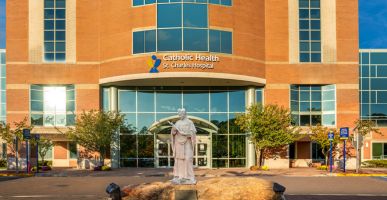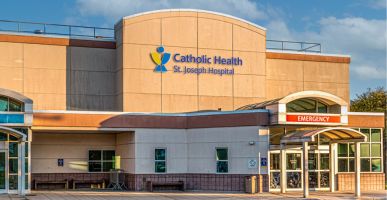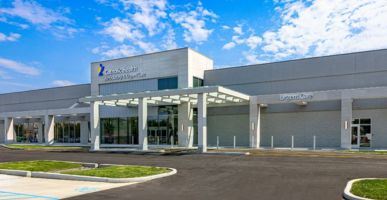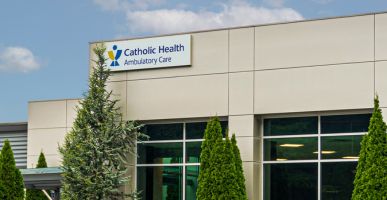Gastroenterology Excellence for GI Disorders
Catholic Health's gastroenterologists across Long Island offer the highest level of care for Long Islanders who need nonsurgical and surgical treatment for gastrointestinal (GI) conditions affecting the stomach, colon, esophagus, small intestine, small bowel, gallbladder, rectum, liver, pancreas and bile ducts.
We use advanced technology to diagnose and treat GI conditions and screen for colorectal cancer.
For patients who require surgical intervention for their GI condition, our nationally recognized surgeons use minimally invasive surgeries for less pain, less scarring and quicker recovery time.
St. Francis Hospital & Heart Center is nationally recognized by U.S. News & World Report for Gastroenterology & GI Surgery.
Diagnostic Tools
An endoscopy is a procedure used to diagnose and treat digestive system issues. The procedure uses a flexible tube with a tiny camera that sends images to a video screen, which allows a gastroenterologist to check for polyps, ulcers and other abnormalities in the digestive tract.
During an endoscopy, the scope can take tissue samples, remove polyps and perform other examinations.
Another type of endoscopy is a capsule endoscopy that can help diagnose causes of gastrointestinal bleeding and disorders such as Crohn’s disease. After swallowing the capsule, a camera takes images of the small intestine.
An upper endoscopy (gastroscopy) diagnoses and treats gastrointestinal conditions affecting the upper digestive system, including the esophagus, stomach and small intestine. Conditions such as abdominal pain, gastrointestinal bleeding, unexplained weight loss and swallowing problems may be diagnosed with an upper endoscopy.
A thin, flexible tube with a camera is inserted through the mouth, allowing a gastroenterologist to see the upper digestive system. The procedure is done under a light sedative and takes 10 to 15 minutes.
A colonoscopy shows a gastroenterologist the inside of the colon and large intestine using a colonoscope (a flexible tube) inserted through the rectum while a patient is sedated.
Colonoscopies help detect abnormalities, such as inflamed tissues, polyps and ulcers, and help diagnose the cause of gastrointestinal bleeding, chronic diarrhea, chronic constipation or unexplained weight loss. A colonoscopy typically takes about 30 minutes to 60 minutes.
Colonoscopies are a standard screening tool for colorectal cancer.
Learn more about colorectal cancer and the importance of early screening.
Flexible sigmoidoscopy diagnoses conditions affecting the lower part of the large intestine or the sigmoid colon. It is sometimes used as a screening tool for colon cancer. During the procedure, a thin, flexible tube with a camera is inserted through the rectum.
Conditions & Services
- Barrett’s esophagus
- Celiac disease
- Diverticulitis
- Fistulas
- Gallstones and bile duct stones
- Gastroesophageal reflux disease (GERD)
- Gastrointestinal cancers
- Colorectal cancer
- Esophageal cancer
- Pancreatic cancer
- Stomach cancer
- Hemorrhoids
- Inflammatory bowel disease (IBD)
- Crohn’s disease
- Ulcerative colitis
- Irritable bowel syndrome (IBS)
- Peptic ulcers
- Swallowing problems
- 48-hour Bravo esophageal pH tests
- Barium swallow tests
- Barrx™ radiofrequency ablation system for removing cancerous, precancerous or diseased tissue from the esophagus
- Breath tests
- Colon cancer screenings
- Colon resection surgery—removal of a section of the large intestine most commonly performed for treatment of colorectal cancer, diverticular disease or inflammatory bowel disease
- Endoscopy
- Endoscopic retrograde cholangiopancreatography—procedure to diagnose and treat problems in the liver, gallbladder, bile ducts and pancreas
- Esophageal dilation
- Gallbladder surgery
- Ileostomy
- Minimally invasive GI surgery such as laparoscopy
- Nutrition evaluation and management, including IV and enteral feedings
- Pediatric gastroenterology
- Polyp removal
- Sigmoidoscopy
- Treatment of gastrointestinal issues in cardiac surgery patients
- Upper gastrointestinal stents
Understanding and Treating GERD
Heartburn and Gastroesophageal Reflux Disease (GERD) is a common chronic condition that involves acid from the stomach flowing back into the esophagus because of the malfunctioning of the lower esophageal sphincter—the muscular valve that closes after food enters the stomach.
Symptoms of heartburn and reflux disease can include:
- Acid reflux
- Heartburn
- Nausea
- Persistent regurgitation
- Difficulty swallowing
- Chronic cough
- Chest pain
The Acid Reflux and Hiatal Hernia Center of Excellence at St. Charles Hospital (Port Jefferson, NY)):
- Help address and provide solutions for patients concerned about long-term side effects and dependence on medications
- Offer minimally invasive anti-reflux surgery procedures
Clinical Excellence

Gastroenterology Experts
St. Francis Hospital & Heart Center is nationally recognized for Gastroenterology & GI surgery.

Cancer Experts
St. Francis Hospital & Heart Center is rated high-performing in Colon Cancer Surgery.
View colorectal cancer Services
Gastroenterology Locations (Hospitals)

St. Francis Hospital & Heart Center
Roslyn, NY

Good Samaritan University Hospital
West Islip, NY

Mercy Hospital
Rockville Centre, NY

St. Catherine of Siena Hospital
Smithtown, NY

St. Charles Hospital
Port Jefferson, NY

St. Joseph Hospital
Bethpage, NY
Gastroenterology Locations (Ambulatory Centers)

Catholic Health Ambulatory Care at Centereach
Centereach, NY

Catholic Health Ambulatory Care at Commack
Commack, NY

Catholic Health Ambulatory Care at East Hills
East Hills, NY

Catholic Health Ambulatory Care at Lake Success
Lake Success, NY






